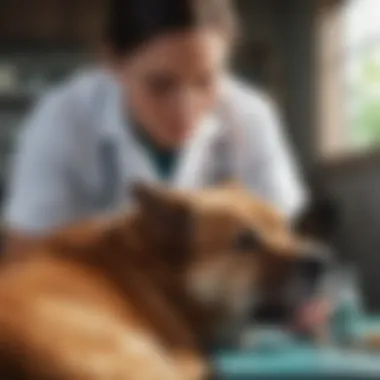Understanding Random Diarrhea in Dogs: Causes and Solutions


Intro
Understanding random diarrhea in dogs is crucial for pet owners. It is a common issue and can result from various factors, from dietary changes to underlying health conditions. This article addresses the causes and solutions, providing valuable insights for dog owners. Recognizing symptoms early allows for timely intervention and better management of your pet's health. Examining the pet's environment and dietary habits can lead to effective solutions, ensuring your dog remains healthy and comfortable.
Understanding Your Pet
Understanding a dog’s specific needs is important. Different breeds have unique traits that affect their health. For instance, some breeds are more prone to gastrointestinal issues. Learning about these traits helps in preventative care.
Breed Traits
Certain breeds such as French Bulldogs and Dachshunds may experience random diarrhea more frequently than others. This is due to their specific genetic backgrounds and physiology. Owners should be informed about their dog's unique needs, as this can guide dietary and lifestyle choices.
Common Temperaments
A dog's temperament can influence its well-being. For example, anxious dogs may exhibit stomach issues, including diarrhea, when faced with stress. Understanding behavioral traits can assist owners in mitigating potential triggers.
Special Needs
Older dogs and those with pre-existing health conditions often require special consideration. Their digestive systems can be more sensitive, making them susceptible to sudden changes in diet or environment. Regular veterinary check-ups for these pets are essential to ensure ongoing health.
Pet Care Essentials
Proper care involves several aspects, including nutrition, grooming, and overall wellness. Each of these areas plays a significant role in a dog’s health and can impact bowel function.
Nutrition and Feeding Guidelines
A balanced diet is critical. Ensure your dog receives high-quality food appropriate for its age, size, and breed. Monitor feeding habits and avoid sudden changes in diet. Introducing new foods gradually can prevent gastrointestinal upset, reducing the risk of diarrhea.
Grooming Tips and Techniques
Regular grooming can enhance your pet’s overall health. Bathing and brushing help keep their skin healthy, while also removing any harmful elements from their coat. This is particularly important if your dog spends time outdoors.
Health and Wellness
Routine health checks are vital. Vaccinations, parasite control, and dental care cannot be overlooked. Maintaining a healthy lifestyle helps in keeping diarrhea-related health issues at bay.
Training and Behavior
Training plays a significant role in nurturing a well-adjusted and healthy dog. Behavioral problems can sometimes lead to physical health issues, like diarrhea, if not addressed.
Basic Training Techniques
Basic commands and house training reduce anxiety and confusion. This, in turn, can minimize stress-related digestive issues, promoting a healthy gut environment.
Behavioral Problems and Solutions
Identifying behavioral issues early can lead to effective solutions. Aggression, anxiety, or fear can contribute to stress. Behavioral training and socialization can help in reducing these issues, improving overall well-being.
Mental Stimulation Activities
Keeping your dog engaged through various activities can lessen stress. Interactive toys, puzzle feeders, and agility exercises stimulate the mind and distract from anxieties that might cause digestive upset.
Engaging with Your Pet
Active engagement is crucial for a dog’s happiness. Providing regular interaction strengthens the bond and helps maintain physical and mental health.
Interactive Games and Toys
Invest in quality toys that challenge your dog mentally. Engaging toys can keep your pet occupied and reduce boredom, leading to a calmer state that may improve digestive health.
Safe Outdoor Activities
Regular outdoor exercise is important. Go for walks, hikes, or play fetch in secure areas. Such activities help maintain a healthy weight, supporting better digestive function.
Family-Friendly Pet Interactions


Include family members in pet interactions. This not only helps in socialization but also reduces potential stressors for the dog, contributing positively to its overall health.
Pet Adoption and Integration
Adopting a pet is a big commitment. Understanding the integration process can help minimize stress for both the dog and owner.
Choosing the Right Pet for Your Lifestyle
Think carefully about your choice. Each breed has different energy levels and needs. Research before adopting to find a good match for your lifestyle.
Preparing Your Home for a New Pet
Before bringing a new pet home, prepare the environment. Make it safe and comfortable. This can help reduce anxiety and prevent stress-related health issues.
Tips for Smooth Prolusion
When introducing a new pet, do so slowly. Allow both the new pet and existing pets to adjust. A smooth introduction can significantly prevent potential conflicts and stress, impacting health positively.
Remember: A dog's health rests on many factors, including diet, environment, and emotional well-being. Being informed is the best way to make sure your dog thrives.
Prologue to Canine Diarrhea
Diarrhea in dogs is a significant topic that affects many dog owners. Understanding it can lead to better health management for pets. Random diarrhea can be a symptom of several underlying factors. Therefore, it is crucial to explore its causes, treatment options, and preventive measures. This section aims to provide a clear and concise overview of what random diarrhea means for dogs and how owners can address it effectively.
Defining Random Diarrhea
Random diarrhea in dogs is characterized by sudden and often irregular bowel movements. Unlike regular diarrhea, which may persist for extended periods, random diarrhea may come and go without warning. It can be due to various factors, ranging from minor dietary indiscretion to serious health issues.
Common characteristics include:
- Increased frequency of bowel movements.
- Change in stool consistency, often appearing watery or soft.
- Possible presence of blood or mucus in the stool, indicating further complications.
Recognizing these signs early can help owners determine the appropriate response, whether it be dietary adjustments or seeking veterinary advice.
The Importance of Understanding Symptoms
Being aware of the symptoms associated with random diarrhea is essential for effective pet care. Many dog owners may overlook subtle signs, attributing them to common digestive issues. Noticing symptoms early can make a difference in the health of the pet. Key aspects include:
- Prompt recognition of changes in bowel habits can lead to faster intervention.
- Knowledge of symptoms helps to distinguish between normal digestive upset and something more severe requiring medical attention.
- It empowers owners to discuss concerns or observations more effectively when they visit a veterinarian.
Understanding these symptoms not only aids in managing your pet's health but also promotes a deeper bond between owner and dog through attentive care.
Common Causes of Random Diarrhea
Understanding the common causes of random diarrhea in dogs is essential for owners seeking to manage their pets' health effectively. Diarrhea can stem from various factors, each with its own implications for treatment and long-term care. By identifying these causes, pet owners can take proactive steps to improve their dog's well-being. Moreover, early recognition of these causes can prevent more severe health issues that may arise from untreated diarrhea. Here, we delve into the most common triggers, providing insights that can assist in prompt decision-making.
Dietary Changes and Sensitivities
Dietary changes often lead to gastrointestinal upset in dogs. Introducing new foods too quickly can cause instability in a dog's digestive system. Dogs may also experience food sensitivities, which means their body reacts poorly to specific ingredients. Common allergens include wheat, corn, soy, and certain proteins like chicken or beef.
Owners should be cautious when changing their dog's food. A gradual transition over seven to ten days is often best. This practice allows the dog's gut to adjust, reducing the likelihood of diarrhea.
Infections and Parasites
Infections can originate from bacteria, viruses, or parasites. Common bacteria include Salmonella and E. coli, while parasites may involve Giardia or worms. These infections can disturb the balance of healthy gut flora, leading to diarrhea.
Recognizing signs of infection is critical. If a dog exhibits diarrhea accompanied by severe abdominal pain or blood in the stool, immediate veterinary attention is essential. Preventive measures, like regular deworming and vaccinations, can go a long way in mitigating these risks.
Stress and Anxiety Factors
Dogs can experience stress from various sources, such as changes in their environment, new animals, or even loud noises. Stress can disrupt normal digestive functions, resulting in diarrhea. It is important for owners to observe their dog's behavior during stressful times and provide a stable environment to mitigate anxiety.
Simple strategies like maintaining a consistent routine and providing a safe space can help in managing stress levels in dogs.
Underlying Health Conditions


Gastrointestinal Disorders
Gastrointestinal disorders encompass a range of issues such as inflammatory bowel disease and food intolerance. These conditions can lead to chronic diarrhea, which is a significant concern for many pet owners. Recognizing the symptoms early may facilitate timely interventions.
One key characteristic of these disorders is the chronic nature of the diarrhea. It often requires dietary management and, in some cases, long-term medication. Understanding these disorders is crucial as they provide insight into why a dog may be experiencing unexpected diarrhea, enabling more effective care options.
Systemic Illnesses
Systemic illnesses, such as kidney or liver disease, can also result in diarrhea as a symptom. These conditions often come with a variety of other indicators, making them complex to identify. The key characteristic of systemic illnesses is that they affect multiple bodily systems rather than just the gastrointestinal tract.
A unique feature of systemic illnesses is their potential to develop silently over time. Thus, regular health check-ups are vital to catch these issues early. Proactively managing a dog's overall health can aid in preventing such illnesses from manifesting further complications, including frequent diarrhea.
Understanding these causes is crucial in providing proactive care for your dog while preventing potential health issues.
By closely monitoring dietary choices, recognizing symptoms of infections, managing stress, and being aware of underlying health conditions, pet owners can significantly improve their dog's health and quality of life.
Recognizing Symptoms Beyond Diarrhea
Understanding random diarrhea in dogs requires attention to other symptoms that may appear alongside it. Recognizing these additional signs can provide clarity on the dog's overall health and help pet owners make informed decisions regarding veterinary care. This section delves into identifying symptoms like vomiting, lethargy, and loss of appetite. Each sign offers insights into potential underlying issues and guides owners on when to seek help.
Identifying Accompanying Signs
Vomiting
Vomiting often appears as a notable symptom that accompanies diarrhea. It's a response that may indicate gastrointestinal distress or an underlying health issue. The key characteristic of vomiting is that it can help the body rid itself of harmful substances. This is beneficial in understanding a dog's health status because it shows the body's reaction to stressors or irritations.
However, what makes vomiting uniquely important is its potential to lead to dehydration. This risk emphasizes the need for monitoring a dog's fluid intake, especially when combined with diarrhea. Owners must observe the frequency and severity of vomiting, as persistent episodes warrant veterinary attention.
Lethargy
Lethargy becomes evident when dogs show decreased energy levels. This symptom contributes to the understanding of a dog's overall condition. The main characteristic of lethargy is the lack of normal activity or interest in play, which can alert owners to possible health concerns. This symptom is popular among pet owners because it can indicate a range of issues, from minor illnesses to serious conditions.
The unique feature of lethargy is its ability to signal systemic problems. A seemingly healthy dog that suddenly becomes lethargic requires thorough evaluation. It can be a challenge to discern normal tiredness from indicative lethargy and should be approached with care when considering veterinary consultation.
Loss of Appetite
Loss of appetite is another crucial sign to consider. It reflects a dog's refusal to eat and often correlates with other symptoms like diarrhea. The primary aspect of this symptom is that it can indicate a variety of health problems, making it a significant part of a health assessment. Understanding changes in eating patterns gives pet owners a window into their dog's digestive health and well-being.
A unique feature of appetite loss is how it can quickly lead to nutritional deficiencies. This aspect is critical since prolonged loss of appetite can affect a dog's overall health. When a dog refuses food, timely veterinary intervention can help identify the cause and address any underlying issues.
When to Seek Veterinary Care
Recognizing when to seek veterinary care is vital. Not every bout of diarrhea or accompanying symptom requires a visit to the vet, but certain indicators should prompt immediate action. For instance, if symptoms persist beyond 24 hours, if there is blood in the stool, or if the dog shows severe lethargy, these are clear signals for professional evaluation.
Each case should be assessed with care. Continuous monitoring of symptoms and their intensity will provide essential information for veterinarians. This proactive approach can make a significant difference in effective treatment and overall health outcomes for the dog.
Immediate Management Strategies
Immediate management of random diarrhea in dogs is crucial as it sets the framework for how well your pet can recover. Addressing this issue promptly can prevent the condition from escalating and ensures your dog remains comfortable. Additionally, effective management strategies can also help analyze the underlying causes, which may guide further treatment. Here, we will discuss the importance of dietary adjustments and monitoring in maintaining your dog's health during such incidents.
Temporary Dietary Adjustments
Feeding a Bland Diet
One of the key strategies in managing random diarrhea is implementing a bland diet. A bland diet refers to feeding your dog easy-to-digest foods that do not irritate the gastrointestinal tract. Common options include boiled chicken without skin, white rice, or pumpkin. This particular dietary choice is beneficial because it allows the digestive system to rest while still providing necessary nutrients.
The primary characteristic of a bland diet is its simplicity. Most of the ingredients are easily digestible, which can help reduce gastrointestinal distress. A bland diet is also a popular choice among pet owners because it is straightforward to prepare and often well-accepted by dogs.
One significant advantage of a bland diet is its efficacy in minimizing further irritation while dealing with diarrhea. Dogs recovering from digestive issues can regain their normal appetite faster, which is essential for overall recovery. However, there are disadvantages as well. Prolonged feeding of a bland diet may not meet all nutritional needs, so it's essential to gradually reintroduce their regular food once symptoms improve.
Hydration Considerations
Another critical aspect of managing random diarrhea is ensuring proper hydration. Dogs with diarrhea lose more fluids than usual, making them susceptible to dehydration. Maintaining their hydration levels is vital for their overall health and well-being. You may need to encourage your dog to drink more water or provide additional hydration through broth or electrolyte solutions specifically designed for pets.
The key characteristic of focusing on hydration is recognizing that a dog's water intake is crucial for recovery. Ensuring they stay hydrated can help their digestive system function more effectively and reduce the severity of diarrhea. This approach is essential, especially since dehydration can lead to further complications, particularly in young or older dogs.


One unique feature of hydration strategies is that you can apply them alongside a bland diet. While providing liquid or broth, it helps to soothe the stomach and supports recovery. The advantage is that monitoring your dog's hydration can prevent critical health issues like renal failure or electrolyte imbalances. But it’s also important to be cautious about over-hydration, especially if there are no improvements.
Monitoring and Observation
After implementing dietary adjustments and ensuring proper hydration, continuous monitoring and observation are crucial. Keeping a close eye on your dog's behavior, frequency of diarrhea, and overall condition allows you to identify if there are any changes, improvements, or deteriorations in their health. Regularly checking your dog's stools, appetite, and energy levels will provide invaluable insights into their recovery process.
Observations may reveal patterns that could help identify the underlying cause of diarrhea, leading to more targeted interventions. If symptoms do not improve or worsen, it is vital to seek veterinary advice. Remember, your dog's well-being depends on careful monitoring during their recovery stage.
Preventive Measures in Pet Care
Preventive measures are essential for maintaining the long-term health of dogs and minimizing the risk of random diarrhea. Understanding these measures can significantly reduce the likelihood of digestive issues arising, thereby enhancing the overall well-being of pets. Owners can take proactive steps to mitigate potential triggers, ensuring the dog's health remains stable. This section covers key elements of preventive care that all dog owners should consider.
Importance of Consistent Diet
A consistent and balanced diet promotes digestive health in dogs. The digestive system of a dog adapts to specific types of food. Any sudden changes can disrupt this balance. Maintaining a regular feeding schedule and avoiding abrupt changes in diet are critical to preventing issues such as diarrhea.
Key Aspects of Consistent Diet
- Quality of Ingredients: Choosing high-quality dog food that is appropriate for the dog’s age, size, and specific needs is essential. Ingredients should be fresh and free from fillers that can irritate the stomach.
- Gradual Changes: If a diet change is necessary, do it gradually. Mix the old and new food over several days to minimize gastrointestinal upset.
- Monitor Reactions: Pay close attention to how the dog responds to their food. Any sign of discomfort, such as diarrhea or vomiting, should prompt a reevaluation of the diet.
A consistent diet provides not only nourishment but also stability, which can greatly reduce episodes of diarrhea.
Stress Reduction Techniques
Stress can be a significant trigger for random diarrhea in dogs. Recognizing stressors in your pet's environment and addressing them is crucial. Reducing anxiety through various techniques can help prevent digestive disturbances.
Effective Stress Reduction Strategies
- Creating a Safe Space: Designate a quiet area in your home where the dog can retreat when feeling anxious. This space should be free from disturbances and clutter.
- Routine Exercise: Regular physical activity is vital for mental health. Exercise helps to dissipate excess energy and can mitigate stress responses in dogs.
- Calming Products: Consider using products designed to reduce anxiety, such as calming collars or supplements. These can provide additional support during stressful situations.
- Positive Reinforcement: Training should focus on positive reinforcement. This method builds trust and confidence, helping the dog feel more secure in different environments.
By integrating these stress reduction techniques, dog owners can achieve a more relaxed pet, which in turn contributes to better digestive health.
The link between stress and gastrointestinal health in dogs is well-documented; therefore, addressing anxiety can significantly reduce instances of diarrhea.
By prioritizing consistent diet and stress reduction techniques, dog owners can take meaningful steps toward preventing random diarrhea and maintaining their pet's overall wellness.
Long-term Health Considerations
Managing a dog's health involves much more than immediate responses to issues like random diarrhea. Long-term health considerations play a critical role in ensuring overall wellness. A dog's digestive system is delicate; maintaining its health can prevent a variety of issues that may arise from neglect or improper care. Focusing on long-term strategies not only reduces the likelihood of future episodes of diarrhea, but also enhances the dog's quality of life.
Assessing Digestive Health
Regular assessment of a dog's digestive health is essential. This can include monitoring changes in stool consistency, frequency of bowel movements, and any accompanying symptoms like vomiting or lethargy. Observing these indicators regularly can provide insights into a dog's digestive status. Pet owners should note any prolonged changes that may indicate underlying health problems. Common signs to observe include:
- Changes in appetite or drinking habits
- Unusual weight loss or gain
- Reluctance to eat or drink
Taking proactive measures may lead to the early detection of gastrointestinal disorders or dietary intolerances. Owners can consult with veterinarians to outline a suitable digestive health plan tailored to their dog's specific needs.
Regular Veterinary Check-ups
Routine veterinary check-ups are paramount in maintaining the long-term health of dogs. These visits provide a structured opportunity to evaluate a dog's health comprehensively. During these visits, veterinarians can:
- Assess weight and body condition score
- Conduct blood tests to check for parasites or infection
- Discuss dietary habits and concerns like diarrhea
- Update necessary vaccinations
Furthermore, such check-ups allow for discussions about ongoing care, potential health risks, and preventive measures. The vet can offer advice on the appropriate diet based on the dog's age and health condition. Establishing a regular check-up schedule signifies commitment to the dog's health and wellbeing, ultimately promoting a longer, healthier life.
Regular veterinary check-ups are a key investment in your dog’s long-term health.
Culmination
The topic of random diarrhea in dogs is of significant importance to pet owners. Understanding this condition can lead to better health outcomes for our pets. Random diarrhea may seem like a simple issue at first glance, yet it can stem from a range of underlying causes. Recognizing the subtle signs and symptoms allows dog owners to take timely action.
The benefits of being informed about random diarrhea extend beyond just treatment. Knowledge empowers pet owners to make proactive decisions regarding their dog's diet and overall well-being. It also fosters awareness about when to seek professional veterinary advice.
In summary, comprehending the complexities of canine digestive health is essential. A persistent problem, such as diarrhea, demands careful observation and diligence. The aim should always be to support the dog’s health and quality of life.
Key Takeaways for Dog Owners
- Understand the triggers: Familiarize yourself with common causes such as dietary changes, infections, or stress. Knowing these can help you prevent future episodes.
- Watch for symptoms: Beyond diarrhea, keep an eye out for signs like vomiting, lethargy, and loss of appetite. These may indicate more serious health issues.
- Implement management strategies: Temporary dietary adjustments and hydration are crucial in managing acute episodes. Always consider your vet's advice.
- Prioritize preventive measures: Maintaining a consistent diet and reducing stress can mitigate the chances of recurrent issues.
- Regular veterinary check-ups: Frequent assessments can assist in early identification of potential gastrointestinal disorders.
Understanding this condition equips dog owners with essential knowledge for optimal pet care.



